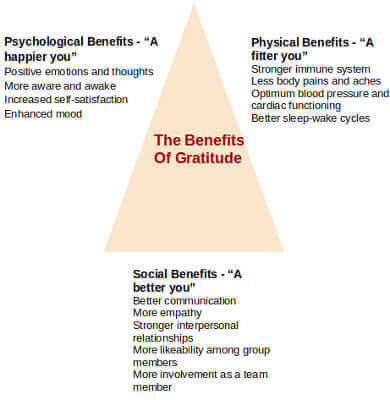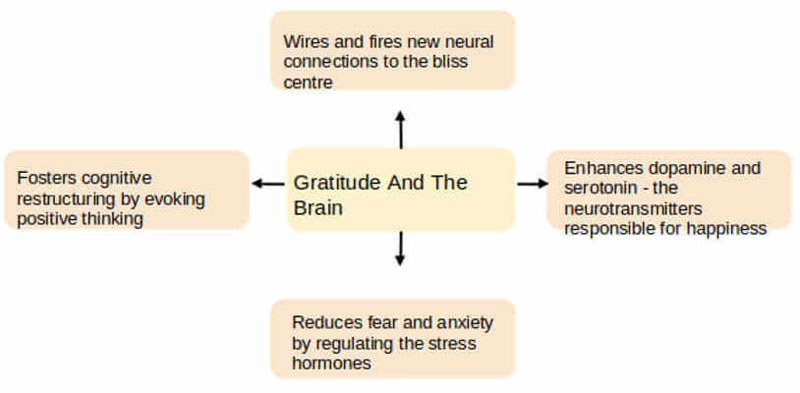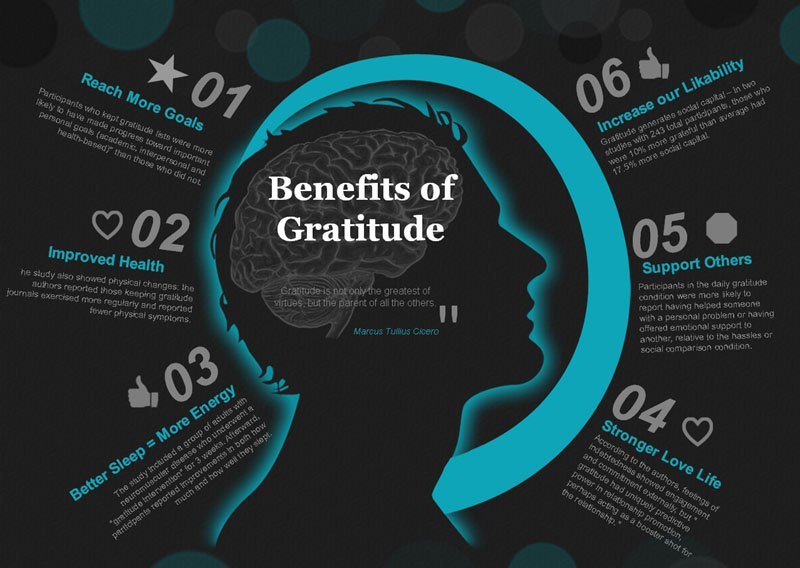Turkey for Your Brain

“It is not happiness that brings us gratitude. It is gratitude that brings us happiness.”
– Stephanie Simpson,
Artist, Speaker and Consultant
The smell of turkey filled the air and the bird itself filled the plates and mouths of many Americans yesterday. As forks slowed and belts were loosened the inevitable question was asked.
“So, what are you thankful for?”
My daughter cringed and said “Ugggh. We did this all week at school!” Ah, middle school teens. She was “Thankful-ed” out but I was overjoyed. What great practice and what huge health benefits! Yes, it sucks to have a counselor dad, sometimes.
Gratitude, as we’ve seen here for years, is powerful. It’s been studied for decades and the positive effects on body, mind and emotions cannot be ignored. In fact, I’ve written about it so much that this year, we’re going to mostly look at pictures to illustrate the fact that science has proven gratitude is the top turkey in the flock.
Exhibit one, to our right, the benefits in balance.
How does this happen? Well, it’s like that turkey we ate yesterday and the drowsy, content feeling we had afterward. The turkey is the delivery mechanism for the chemical tryptophan which makes us feel that way. Gratitude is the vehicle for dopamine and serotonin—it’s like turkey for our brain! “When we express gratitude…our brain releases dopamine and serotonin, the two crucial neurotransmitters responsible for our emotions, and they make us feel ‘good’. They enhance our mood immediately, making us feel happy from the inside” (Chowdhury, 2021).
Now let’s look at exhibit two, below. This simple chart shows how gratitude actually works in our brain.
Please check out the left-hand and top boxes especially. Gratitude “wiring and firing” new neural connections “to the bliss centre” and fostering cognitive restructuring is pretty amazing. Why? Because that means that the more grateful we are, the more our brain is changing for the better. Forever. We are becoming more grateful, more positive and over-all healthier. This is all due to how gratitude activates the hippocampus, sooths the amygdala, stimulates the hypothalamus and fosters over-all better brain function.
So, how do we be more grateful? We can do it just like at the Thanksgiving table yesterday, we can keep a gratitude journal daily…it’s as simple as noticing what we have and taking a moment to be grateful.
Those too busy for a daily gratitude practice are in luck as well. According to Dr. Joel Wong, Dr. Joshua Brown, professors at Indiana University who studied the effects of gratitude for Greater Good Science Center, growing more grateful doesn’t even have to be a daily practice. They studied people who wrote gratitude letters once per week over three weeks and found that not only did those effects occur while writing the letters but had a “snowball effect” that lasted for up to 12 weeks of increased mood and other gratitude benefits! (Wong and Brown, 2021).
Experts all caution that while some effects of gratitude are immediate, others take time to grow. But, if we’re anything like my daughter, we’ve had a great deal of practice being grateful this week. As Thanksgiving makes way for the holiday hustle, let’s keep building on that practice.
One moment of gratitude today means a lifetime of better living. I’m thankful for that.
There. I got my daily moment of gratitude in.
Your turn.
Chowdhury, M.R. (2021) The Neuroscience of Gratitude and How It Affects Anxiety & Grief. Positive Psychology.com. Retrieved from: https://positivepsychology.com/neuroscience-of-gratitude/#:~:text=The%20Neuroscience%20of%20Gratitude%20and%20How%20It%20Affects,5.%20Gratitude%20reduces%20anxiety%20and%20depression.%20More%20items
Wong, J. and Brown, J.(2021) How Gratitude Changes You and Your Brain. Greater Good; Greater Good Science Center. Retrieved from: https://gratefulness.org/resource/gratitude-changes-brain/




 Previous Post
Previous Post Next Post
Next Post